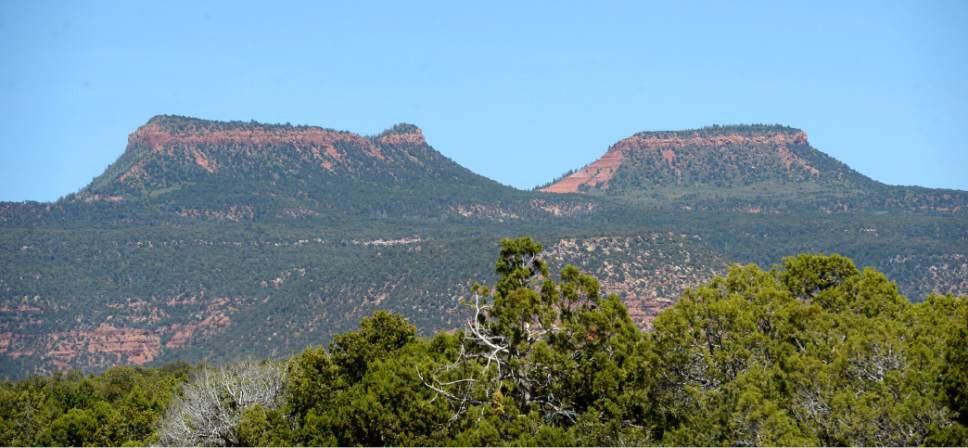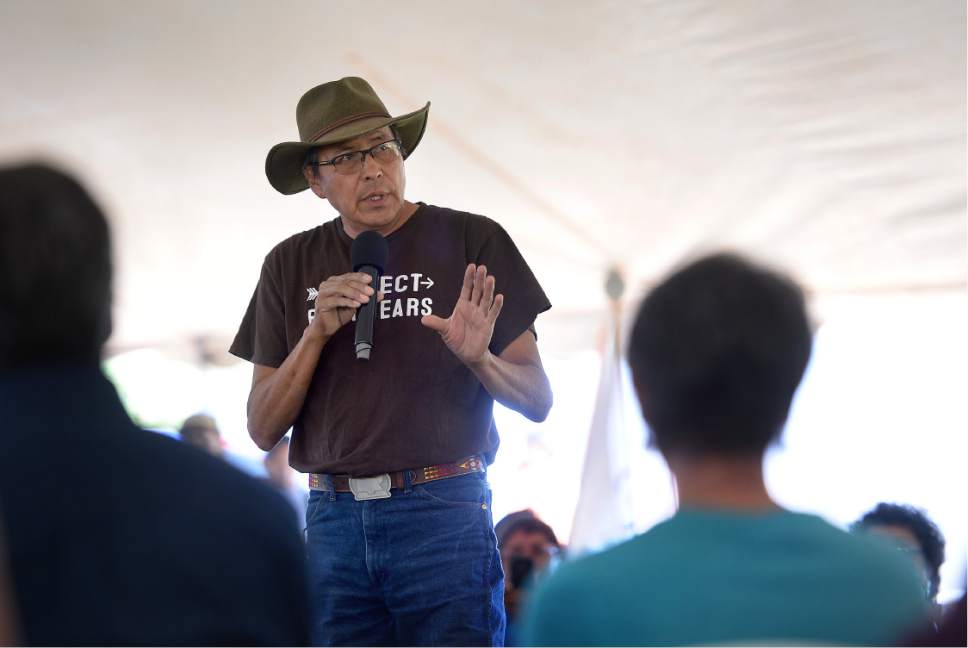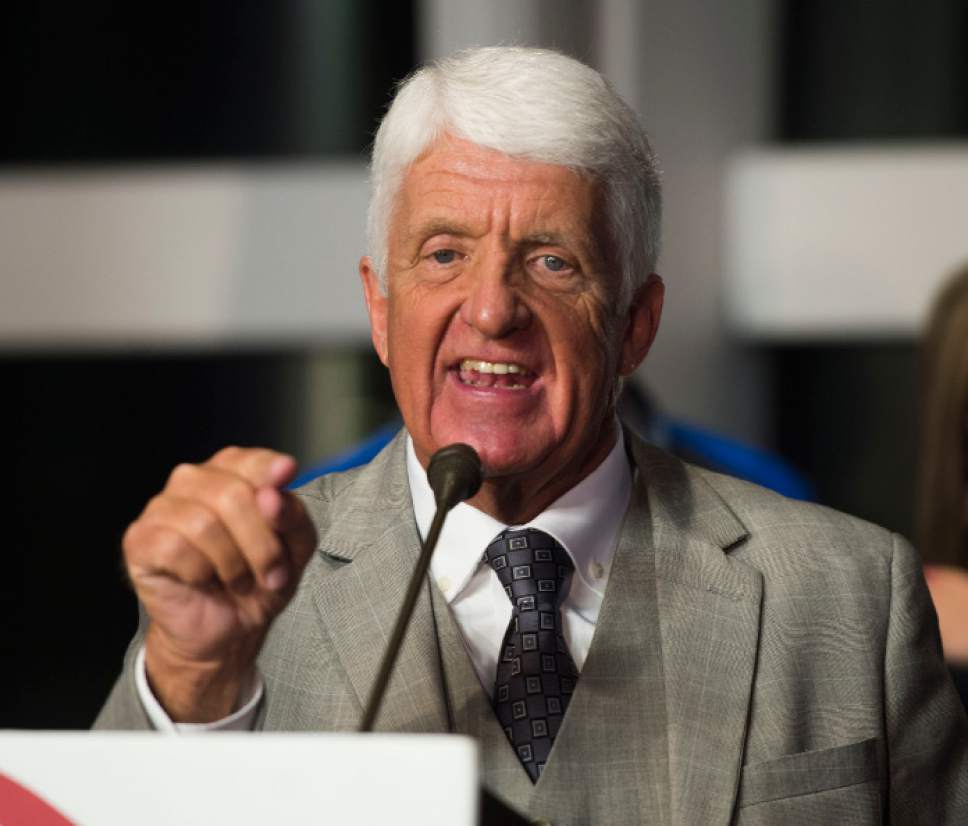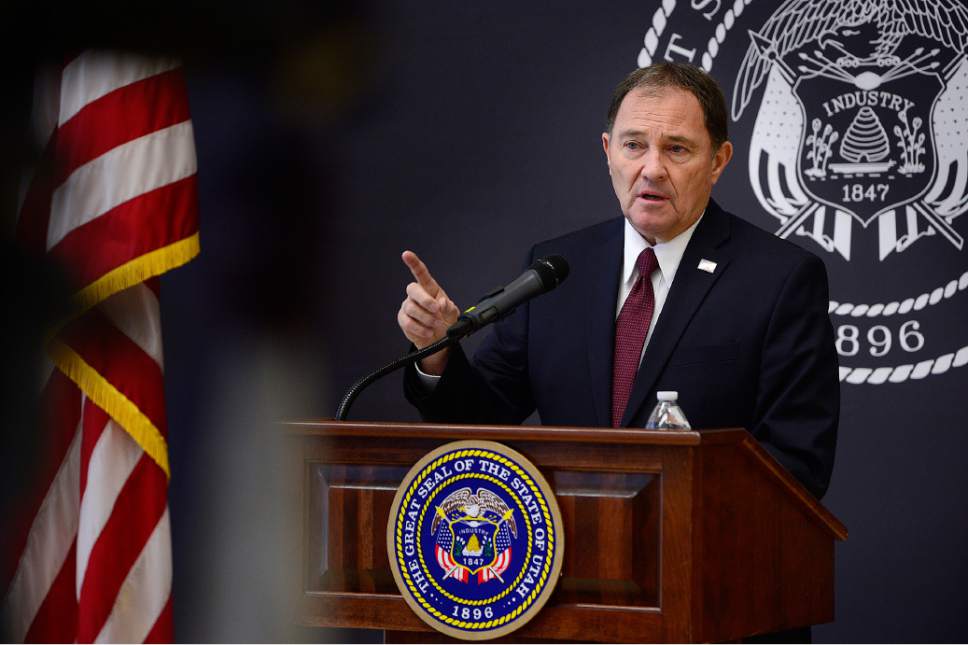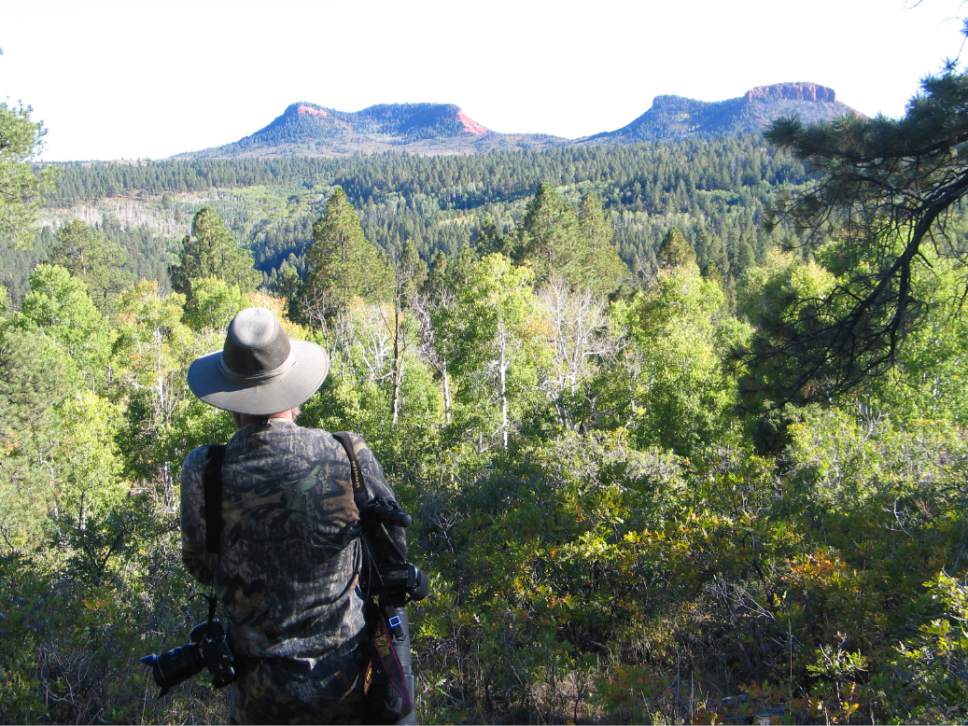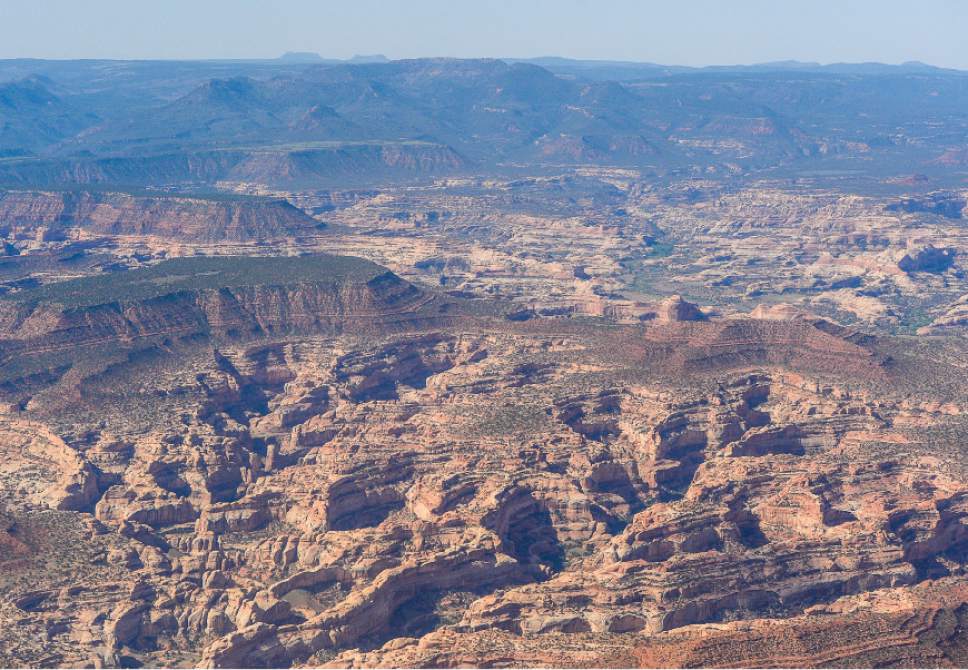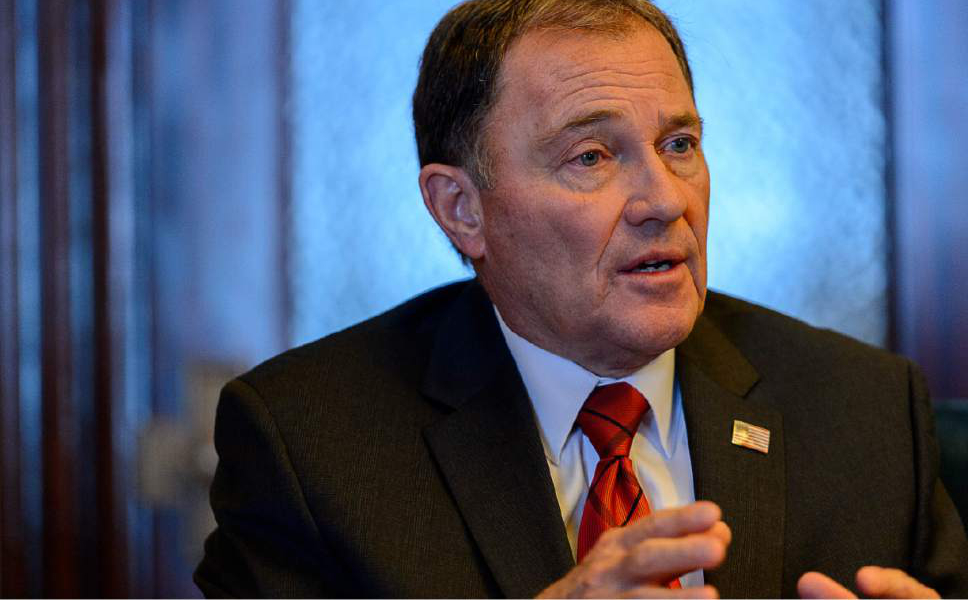This is an archived article that was published on sltrib.com in 2016, and information in the article may be outdated. It is provided only for personal research purposes and may not be reprinted.
Rep. Rob Bishop has a wager going with members of his staff: The congressman is betting $50 — not insignificant on a government salary, he says — that President Barack Obama will not create the Bears Ears National Monument before leaving office.
But with time running out on Obama's term, speculation has ramped up that the outgoing president could act as early as next week on several tribes' request to create a monument, a move that Bishop, Gov. Gary Herbert and Rep. Jason Chaffetz warned Thursday would be a mistake and vowed that they would do everything in their power to fight.
Herbert said he spoke Monday with White House Chief of Staff Denis McDonough, who assured the governor that no decision had been made on whether the president would create the monument. But he acknowledged there has been widespread speculation that the designation could come soon.
Should Obama set aside this million-acre-plus landscape in San Juan County, conservation leaders called on Herbert to use his leadership to encourage Utahns to make the most of the designation rather than fanning local resentments and raising false hopes that the monument will be short-lived.
"We have seen this pattern of Utah politicians saying, 'We will fight and undo this.' It's not going to happen and that misleads the local community that they shouldn't step in and figure out how to make this stuff work for them," said Scott Groene. The executive director of the Southern Utah Wilderness Alliance (SUWA) probably wouldn't mind taking up Bishop on his $50 wager, but he says he wished Bishop and Chaffetz could have advanced protective legislation that would have made a monument designation unnecessary. Now it's too late and SUWA has joined with other groups urging Obama to proclaim Bears Ears.
The governor acknowledged a need to protect some of the land under consideration for the monument — which is rich with American Indian artifacts — but he said even tribal groups in the area generally oppose the monument.
"There really is not a lot of support. At best, our Native American support is mixed," he said, noting that some supporters of the monument lost their re-election bids last month, partly because of their backing of the monument. The candidates who beat them, however, did not campaign on anti-monument platforms, monument advocates say.
"It's not a matter of, 'do we want to have some additional protection provided,' " Herbert said. "If we want to have additional protections, there is a better way to do it and that is legislatively."
Bishop and Chaffetz proposed a sweeping land-use bill called the Public Lands Initiative, or PLI, a portion of which would have created two national conservation areas on a sizable portion, but not all, of the land under consideration for a monument.
With near unanimity, tribes and the environmental community have panned the overall bill, which affects seven eastern Utah counties, as a monumental failure, arguing it is far too deferential to development and weakens environmental safeguards.
"We wished Representative Bishop would have succeeded with the PLI. We tried really hard. That would have been a good thing and they totally failed," Groene said. "They just threw in the towel a year and half ago. What we don't want to see them do is say they are going to fight the monument over and over."
The House adjourned last week without taking a vote on the PLI, but Bishop pledged to reintroduce it next year and secure a vote.
Some have suggested Obama could create the monument based on the boundaries in the PLI as a sign the administration listened to local input, but Bishop said that "would be a cynical ploy to try to justify it improperly."
The conservation areas in the PLI would not be as restrictive as a monument could be, Bishop said, and promises made to tribal leaders that they could have some say in how the land is managed run counter to the law.
For months, the White House has been lobbied by American Indian and environmental groups to protect 1.9 million acres in the region. There have been frequent meetings on the issue with the delegation and the governor, and Interior Secretary Sally Jewell traveled in July to southeastern Utah for town-hall meetings on the issue.
Utah Dine Bikeyah, a coalition of tribes supporting the monument designation, noted Congress had an opportunity to protect the area but did not, and said the time is right for Obama to step in and protect the nation's "most significant unprotected cultural landscape."
"President Obama, please declare Bears Ears a national monument," said Kenneth Maryboy, president of the Navajo Medicine Man Society and president-elect of the Mexican Water Chapter House. "Bears Ears has been a traditional and spiritual place for us Native Americans forever. Let's keep it that way."
Chaffetz said that the White House has not spelled out how it plans to manage the monument and what acreage would be included, if it is designated.
"It would be the height of arrogance to impose this monument without consultation with the governor and the delegation, those who represent this area," Chaffetz said. "The only ones I can find in favor of the monument are some radical environmentalists … who are willing to bypass everyone's input and just want a monument."
SUWA rejected Chaffetz's assertion that the Obama administration ignored Utahns' feelings, pointing to Jewell's tour, when she and top officials with the Bureau of Land Management and the U.S. Forest Service sat down with county commissioners and other local officials.
"He confuses the term consultation with agreement. There's no doubt there has been consultation. State, local, national, an unprecedented level to visit with local residents, with tribal leaders, with stakeholders and hear their input," said SUWA legal director Steve Bloch. "They have gone to the ends of the earth to hear their concerns. If there's a monument, folks may not be happy with it, but it wasn't because there wasn't an opportunity to have their voices heard."
Bishop said, if the monument is designated, "we will use every tool at our disposal" to reverse the action, including oversight hearings on the process behind the declaration, efforts to pass the PLI to overturn the monument, and working with the incoming Donald Trump administration to undo the monument.
"It's a gamble for the administration to go down this path," Bishop said. "It's not wise for them to do it and it's lousy public policy."
Sen. Mike Lee, in a video posted on his Facebook site, said there is no local support for the monument and warned the designation could exacerbate joblessness in the area and prompt Congress to possibly repeal the Antiquities Act.
"[Obama's] legacy may well be the disruption, the review, the revision or perhaps the complete repeal of the Antiquities Act," Lee said. "I don't think he wants that to be part of his legacy, and I certainly don't think he wants it to be his legacy to further impoverish the most poverty-stricken corner of the state of Utah in San Juan County."
SUWA staffers, however, pointed out the prosperity Utah's national parks, four of which began as national monuments, have brought their surrounding communities. Groene singled out Lee for criticism, noting the senator's vow to block funding for a new monument.
"He says, 'We all want to protect this place, but the first thing I'm going to do is throttle it so there is no money for management,' " he said. "Those two things don't go together. Why, when everyone agrees that we should protect the cultural resources, wouldn't the delegation say, 'We are going to have the federal government pay for the kind of management you need to protect this place?' "
Bishop said he is confident that, with Republicans in control of the White House and both chambers of Congress, he will be able to pass the PLI next year, which he argued would trump the monument designation. But he still wants the White House to back down and let Congress handle the matter.
"There's that fear in the back of my mind that maybe it won't be that easy to overturn it. And if you're going to do something, for gosh sake, do it the right way the first time," he said, accusing the administration of "trying to pat itself on the back" on the way out of office.
No president has ever undone a monument designation, although the boundaries of some have been scaled back, and it is unclear if Trump could reverse the declaration. Bishop said that, because the designation would be "so egregious" he believes the courts would allow Trump to undo the declaration and Congress would likely rewrite the Antiquities Act, which for 110 years has empowered presidents to create monuments to protect "objects of historic and scientific interest."
There was widespread outrage back when presidents set aside Utah's treasured landscapes. Groene pointed out that Utah newspapers, including The Salt Lake Tribune, had editorialized that Arches' monument designation in 1929 and subsequent expansion and upgrade to a park would bankrupt Moab, a city now struggling to accommodate masses of visitors and hospitality workers. And the town of Boulder changed its name to Johnson's Folly after President Lyndon Johnson greatly expanded Capitol Reef National Monument as he was leaving office in 1968.
Bishop said in those instances the parks were smaller than what is being considered for Bears Ears, they had specific antiquities they were trying to protect, and they were later codified by Congress.
Twitter: @RobertGehrke


